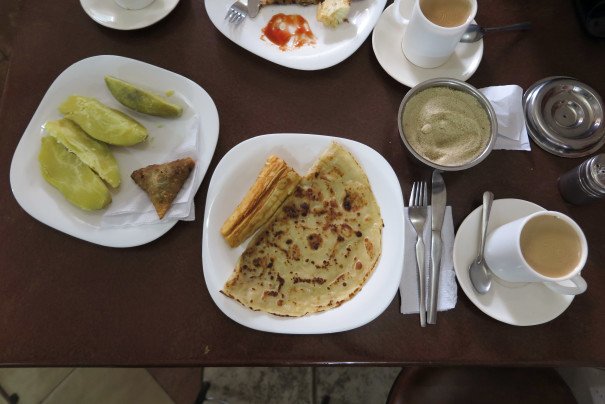
Who Needs Fruit When You Can Have Carbs?

Who Needs Fruit When You Can Have Carbs?
Masala Chai and Tubers in Nairobi
I want a piglet, so we go to market.
It’s a sort of unsettled morning. Gray, with a dull buzz. Burundi is on the radio again, BBC World Service drifting through the traffic, everything suspended in the early morning oblivion.
Nairobi City County market has acquired a new sign since I’ve last passed: OPEN 24 HOURS. Yet 7 am is clearly rush hour for cleavering; white coats, gumboots, and hospital horror splatter.
Mwangi degloves to make some calls. Promises me he’ll find me a good specimen for Saturday’s roasting experiment scheduled for our Serbian neighbors’ self-built wood-fired backyard oven.
Nivi steers us around the corner, onto Bishiara Street, and to a doorway behind the newspaper seller. It’s been over a year since I’ve seen her, and the city. Life messiness has gotten in the way: coverage of a never-ending Paralympian murder trial, a love affair with an artist, the end of a love affair with an artist. It’s an adopted homecoming of sorts; time for tea.
The G&R restaurant, announced by red letters painted on whitewash, is dark inside with wall-mounted fluorescent tubes. The G&R annex next door is wood-carved and happier looking. We opt for the former.
Inside, two wan goldfish swim listlessly in their dim tank by the lattice partition in place of a door. A paper sign in highlighter yellow and BOLD ARIAL CAPS declares opening hours between 4.30-2.00am daily above a vegetable decal from the 1970s. I imagine taxi drivers and tired dancing girls slumped over rattan table legs. Right now, it is the domain of men in suits with white melamine mugs.
Felix has fixed his cracked conference-hand-me-down name badge with sellotape. He runs over, earnest, black waistcoated, and flashes an enormous smile.
The menu offers Egg, Ommelets & Sand Witches. Let me give you a Spanish, Felix says to me. The Spanish, it is really, really, very, very good. The suited businessman to my left is absently coaxing his strips of pancake into neat rolls before spearing them, lost in the Daily Nation. I order from the Roots & Snacks section.
The masala chai arrives, brown skin growing in the middle of my mug. They boil it all together, in a pot on the stove, Nivi says, shoveling in teaspoons of sugar.
The heat hits the back of my throat, scalding in an explosion of ginger, cloves, cardamon, and nutmeg. It’s weak on tea, seemingly replaced with pepper. It burns all the way down, then settles into a prickly, comforting warmth. The milk skin catches on my teeth, and I try to rub it away without anyone noticing, hide it in my napkin.
Nivi is fingering her hoop earrings and asking what color I think her latest project should be. A female tech entrepreneur in Africa’s proclaimed tech hub, she’s been digitizing the Kenyan primary school syllabus for tablets. Now, they’re putting together remote classrooms: a BRCK for Internet access and tablets loaded with lessons, all inside a shockproof, waterproof gear case on wheels, which recharges everything overnight. We decide the case should be bright yellow and resemble a spaceship.
On two wall-mounted televisions in opposite corners, 40 of Kenya’s most successful women under 40 are dispensing wisdom on a morning talk show. “You should eat fruit,” one reveals. “Look after your body, too.”
We aren’t eating fruit.
My pancake has arrived with a deep fried hunk of muhogo, cassava dropped in the deep fryer so it splinters and then sticks to the roof of my mouth. On a side plate, dense slabs of ngwaci promise to behave similarly, sweet potato boiled into near-crumbliness. A beef samosa perches on the edge of a saucer, wondering what it’s doing amid the carb fiesta.
Nivi is unperturbed. She squeezes a glob of ketchup onto her plate from a squeezy bottle—luminescent fuchsia, reminiscent of fake blood from hostile environment training—then adds a dollop of opaque chilli and swirls them together with a torn shard of chapati.
Matilda, the manager, comes over with crooked teeth and a perfectly combed bowler weave to inform us we’re eating the Best African Breakfast in Nairobi. Meat and vegetables and milk from Godfrey and Richard—fraternal co-owners—and their shamba in Kiambu, on the outskirts of town.
What does G&R stand for, I ask Felix.
Gatundu Restaurant, he says, confidently, That’s where the owner is from. And the president, too.
I persist: What about the “and?”
Gatundu AND Restaurant, Felix says proudly.